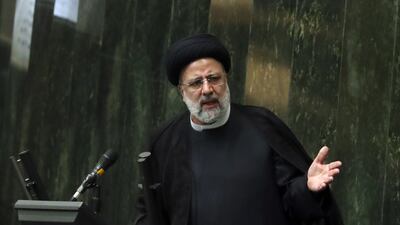Iran's Parliament on Wednesday approved almost all of President Ebrahim Raisi's Cabinet choices, enabling him to start working in earnest with his government, after his June election victory.
Politicians approved 18 of 19 candidates put forward by the ultra-conservative Mr Raisi for the ministerial posts.
They rejected only his choice for the education portfolio, requiring the president to choose again.
In a country where ultimate power rests with supreme leader Ayatollah Ali Khamenei, Mr Raisi inherits a difficult socio-economic situation.
Iran has been strangled financially by sanctions reimposed by Washington after then US president Donald Trump pulled out of a multilateral nuclear deal in 2018.
The country of 83 million people has since been hit by a severe economic crisis worsened by the Covid pandemic.
Iran is dealing with a fifth wave of infections, its strongest yet.
The country recorded its highest daily death toll on Tuesday, with 709 fatalities registered by the Health Ministry.
Mr Raisi won a June 18 election marred by record low turnout and an absence of significant competitors.
He succeeds moderate president Hassan Rouhani, architect of the political opening that culminated in the 2015 nuclear agreement between Tehran and major powers.
But that opening was negated by Mr Trump and much of Iran's conservative camp.
The new president was sworn in by Parliament in early August, but the departing administration remained at the helm until Wednesday's parliamentary vote.
The confidence vote in the strictly conservative line-up – all men – will allow Mr Raisi to start leaving his mark.
The president announced on Saturday that his government's first priority will be the battle against coronavirus, closely followed by the economy.
Russia, China and western powers are all keeping a watchful eye for any sign of willingness by Iran to resume discussions that began in Vienna in April, aimed at salvaging the 2015 nuclear deal.
The parties agreed in late June to meet for a new round of talks, but discussions have yet to resume.
After his election victory, Mr Raisi declared on June 20 that he would not permit talks merely for "negotiations' sake".
But he also said: "Any negotiations that guarantee national interests will certainly be supported."
New Foreign Minister Hossein Amir-Abdollahian made no reference to the 2015 deal on Wednesday, listing other matters as the top concern in messages posted after taking office.
"Neighbours and Asia are the number one priority," he wrote on Twitter.
The 2015 deal offered Iran an easing of western and UN sanctions in return for tight controls on its nuclear programme, to be monitored by the UN.
The accord negotiations in Vienna, indirectly with the US but directly with other parties, seek to bring Washington back into the fold.
When the last round of talks finished in June, the plan was to soften US sanctions in exchange for Iran adhering strictly to its nuclear commitments.
In retaliation for Mr Trump's withdrawal three years ago and his sanctions, Iran in effect abandoned most of those commitments.
Elsewhere on the diplomatic circuit, one of the first decisions for the new government will be who to send to an Iraq-hosted regional summit due to take place on Saturday.
The summit seeks to ease tension on several fronts, and Iraq has said that Mr Raisi is among those invited.
Along with the prospective ministers, Iranian Cabinets are composed of several vice presidents who do not require parliamentary approval.
So far Mr Raisi has named four of them.
Among them is Maj Gen Mohsen Rezai, a former chief of the Islamic Revolutionary Guard Corps and among the losers in the presidential poll.
Gen Rezai was named vice president in charge of economic affairs.

